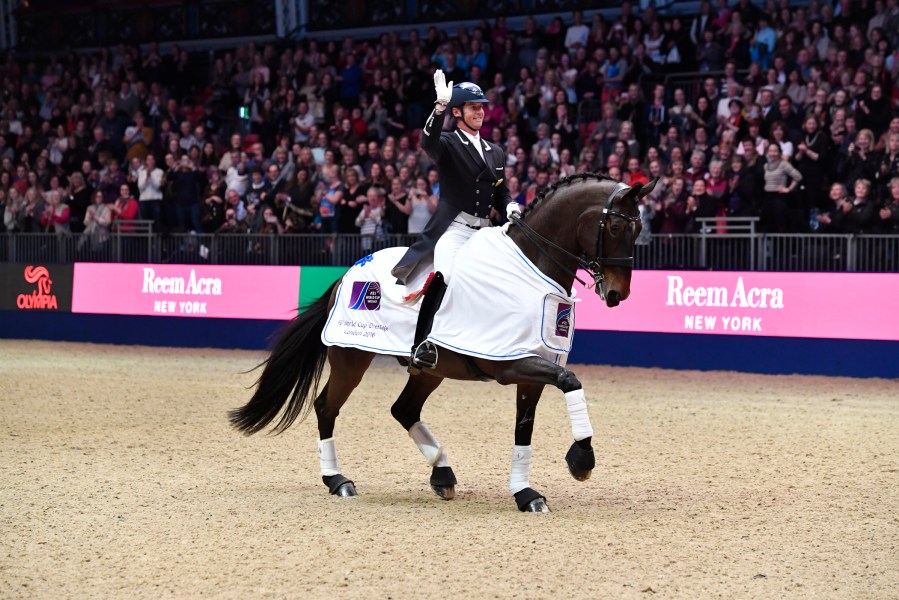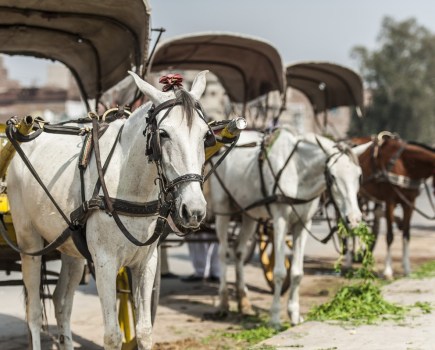Carl Hester shared his favourite tracks and memories, both in and out of the saddle, on BBC Radio Four’s Desert Island Discs.
The dressage star gave an insight into life as an Olympian, top trainer and animal lover, as well as sharing the appeal of the sport to non-riders.
He also spoke about his upbringing and life as a child in Sark on the Channel Islands, where cars are banned and horses are part of daily life.
Carl said his early days in the saddle helped him develop a strong foundation.
“You very rarely had a saddle and you do need to learn balance,” he told presenter Lauren Laverne. “Every great rider I know has great core strength and we used to ride without a saddle a lot.”
He said some of the best horses do not show their potential until they become more mature.
“They are like people and they do all have different personalities, and finding which ones which do work and which ones want to work — all shapes and sizes can get to grand prix level — is just great,” he said.
“The amount of horses where we’ve said, ‘This one isn’t going to make it’ and it’s always the way, when you don’t want them no one will, and it will take until they’re eight or nine before we can say, ‘This one has a long future ahead of him as a dressage horse’.”
He told Lauren that music for dressage must have a very good beat.
“It has to match their footfalls,” he said. “It’s good when you compose a programme that it does tell a story.”
Valegro at home
Carl confirmed that Valegro was not one of those horses, “he was a professor from the age of four,” he said.
“He was easy to break in, he understood all the things we asked of him,” he said. “He was able to be a completely normal Pony Club type of horse, he was the ultimate athlete but also have children coming to yard who are terminally ill, for instance, and they are able to pat him, sit on him.
“What an incredible horse. I think he is well-known to a lot of people who aren’t horsey.”
At home, Carl has a whole host of animals, including five peacocks, 23 guinea fowl, 12 hens and a cockatoo, which he is very used to. His clients can find the menagerie more unusual.
“When I’m teaching they can be in the middle of a very complicated move and next thing 23 guinea foul run across the arena screaming and cackling,” he said. “The birds make me feel like I’m in a paradise.”
Carl said this sort of acclimatisation is beneficial for his horses.
“I think London [2012], particularly going down that shoot [to start], was spine tingling — the noise the crowd made for the British riders. We were so fortunate that our horses seemed to accept it and stayed relaxed.
“I was really excited that so many people were coming to see the sport and the atmosphere was incredibly happy and that just rubbed off on all of us.”
Carl said he would love to attend the next Olympics, but it was not a given.
“I’m hoping to go there,” he said. “I do realise there are lots of people snapping at my heels, only three riders will be able to go.
“I would love to get another Olympics and help the team again. This is the first time after a major competition, and we’ve had two major championships this year, that I’ve finished and not said, ‘I wish I didn’t have to do this this any more’ and I really would love to go and do one more, Paris is only a stone’s throw away.”
Carl’s desert island
- Disc one: Castles by Freya Ridings. “When I ride in the mornings and sometimes a song comes on that just has a really good beat to it and really lifts you up and helps the horse move more and you ride better, and this was one of them.”
- Disc two: Fleurs Du Mal by Sarah Brightman. “This was part of my music composition at the London 2012 Olympics.”
- Disc three: Brand New Key by Melanie. “This is the first song I remember. This got played again and again, and I always wanted to roller skate.”
- Disc four: Some Girls by Racey. “When I was at boarding school we had dens and they were rooms where each year group could play music and chill out and some of them had record players and this was the first record I ever bought.”
- Disc five: Slave to Love by Bryan Ferry. “It’s a beautiful song and also has some incredible lyrics. As a moody teen I remember listening to lots of Bryan Ferry.”
- Disc six: Barcelona by Freddie Mercury & Montserrat Caballé. “It does remind me of being in Barcelona and my first opening ceremony. To hear this song performed on a hot summer’s night in Barcelona, it brings back great memories.”
- Disc seven: The Windmills of Your Mind by Noel Harrison. “There are so many in the horse world from different worlds. Harriet Harrison’s father was Noel, her children are my god sons and we love spending time together and whenever we have had too much to drink together this is the song we sing together very badly.”
- Disc eight: Bette Davis Eyes by Kim Carnes. “This song never gets tired.”
- Book choice: The Centenary Book of Sark: a history and description of the artist William A Toplis by Chris Andrews, Fiona Kelly and Amy McKee. “This is a book I given for my 50th birthday. When I look through this book of Sark it makes me realise how fortunate I was to be brought up there.”
- Luxury item: Carl’s own pillow. “The life I’ve lead has chipped away at my back. The one thing that changed my life was a pillow that has already been round the world with me. I left it all over the world it has more air miles than me.”
- Castaway’s favourite: Bette Davis Eyes by Kim Carnes. “However hungry I was and however much I wished there was a bar, if I played this it would relax me and I would be happy.”
Carl’s episode of Desert Island Discs was broadcast on BBC Radio Four last month (21 November).









